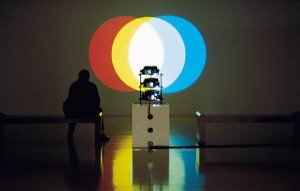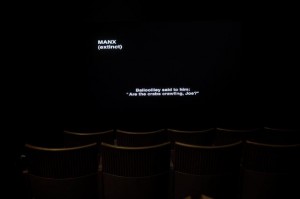“I know what it’s like to feel unequal to the task required of you… to feel incapable. I’ll never be the man I was, but I’ve come to embrace those parts of my mind that are… peculiar and broken. I understand now that’s what makes my mind special. I wish you could see yourself the way I see you. You have no idea how extraordinary you are. If you can embrace that, there’s no end to what you can do.”
— Walter Bishop, in Fringe
Last time I was considering how pop-culture can inform (and occasionally misinform) one’s personality, especially for those of us whose interests in the spiritual lead us to draw on fictional sources. I asked;
“…when you’re actively trying to build or rebuild your personality around such a basis… what do you do?” How, exactly, does it work when you’re using riffs from multi-media as a way to explore and expand your personality?
Luckily, as I was writing, a perfect example came up. (Synchronicity is, as ever, the magician’s main ally.)
The above quote is from the penultimate episode of the third season of Fringe. For those who haven’t seen the series, (and I really recommend you do) it’s an odd little show which has grown from a monster-of-the-week X-Files vibe into a complex and emotionally satisfying piece of science fiction TV with a lot to recommend it. The quote comes from a scene where two of the protagonists are working on a dangerous problem which can only be solved by the harnessing of the suppressed psychic abilities of one of them, FBI Agent Olivia Dunham – powers which were induced during her childhood by the other, a full-blown Mad Scientist named Walter Bishop.
Walter is, to put it mildly, a broken man. A genius in several fields and a pioneer in the realm of fringe science, he’s no stranger to mind-altering drugs, spend seventeen years in a mental home and has had several pieces of his brain removed – apparently as his own behest. He has caused immense harm to Olivia in the past, but despite this they have become allies and uneasy friends.
I wept when I first saw that scene. Pure absolute recognition. It was like those words had been written to pierce straight through to my soul.
Of course, they weren’t. Despite the fact that I occasionally entertain as a useful exercise the thought-experiment of The Invisibles’ Mason Lang, that certain bits of pop-culture were created as messages and instructions for the rebellious and inquisitive, I don’t actually think that there’s a hidden Hollywood cadre of illuminated beings beaming Pure Truth to the Worthy. But sometimes it really feels like there is.
The parts of my mind that are, as Walter says, peculiar and broken, have a shape to them. And sometimes, a film or movie or book or piece of music seems to fit into one of the gaps, drop into place almost seamlessly – and part of me that was incomplete and gaping open and raw feels, even if just for a moment, whole. I think that part of our development as people, what Jung called Individuation, is a process of finding such pieces, trying them out, seeing if they fit. Tessellation of the soul.
That’s why I don’t feel that incorporating a whole personality or a single mythos into your head works terribly well. We’re all of us broken and incomplete and flawed in different ways. I suspect that in most cases, dropping an entire fiction-suit over the top of all that doesn’t actually help to repair the holes, it just covers them up for a while. Band-Aids on arterial spray. It would, I think, be a terrible idea to just become Walter Bishop, even though he’s one of the most delightful characters in modern television – he pisses himself occasionally, has crazed rants at supermarket packaging, makes terrible decisions that have catastrophic consequences… and, like all such people from all such worlds, he’s incomplete in a significant way, because he’s a fiction. Even more than the rest of us ‘real’ people. Drawing on these archetypal figures for wisdom and guidance, maybe even for the odd quirk or habit, is a good and useful start, but it’s just a start… because their creation is so very different from ours. Their strengths and deeds, flaws and weaknesses are not the same. Similar enough to be useful, but only in part.
I also think that it’s the very act of adapting to our flaws and weaknesses that constitutes spiritual and mental growth. But for that to happen, there has to be a wound to heal.
I don’t know a single person who’s a practitioner of magic or other spiritual exercises who has not, at some point, suffered greatly. Health problems, abuse, being outcast – these are so common among the Tribe of the Strange as to practically be signs of membership. It’s more than possible, I think, that it’s these traumas – and, more importantly, how the survivor of them adapts and grows to compensate for them – that are where the magic enters. All shamanic systems rely on shock as a means of initiation – an attempt, I suspect, to induce these fractures into people to let the light in.
(This doesn’t always work, either when deliberately induced or accidentally endured. There are plenty of folk out there who are broken and this just doesn’t happen for them. The other factors involved are variable in the extreme. Plus, it makes an awfully convenient excuse for power elites to harm others in the name of Illumination and initiation. Nothing’s perfect.)
For those of us who are broken in this particular way, there’s usually some combination – between the yearning for greater completeness, connection with others and the world, and the initial breach – which makes for a mage, a shaman, a seeker. My own journey on that Path quickly led me to realise that wisdom, guidance – tools – can come from anywhere the soul can recognise as true. That fits those broken places.
This scene from Fringe not only speaks directly to that, but perfectly encapsulates it for me. It won’t for others. That may be the entire point. But if you’re one of the broken ones, one of the Tribe of the Strange… seek your stories, your metaphors, your Truths (the good ones are usually plural) and share them, compare them with others, regardless of their background and beliefs. We can only grow by combining our stories, our toolkits… using them to change our minds, literally.
And, like Walter Bishop said – if you can embrace that, you can be extraordinary.
Olivia: I know that you want to believe in me, and I want to believe in me. But believing doesn’t make it true.
Walter: Just try.
—Fringe



